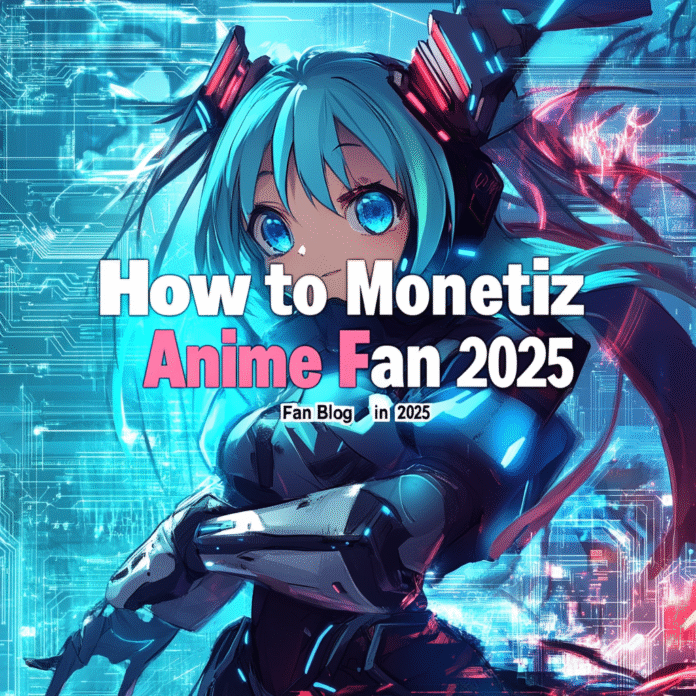1. Introduction
When creators ask How to Monetize Your Anime fan blog in 2025, they need more than general blogging tips: they require domain-specific insights. Anime fans expect deep analysis, passionate community engagement, and recommendations that reflect their niche interests—from the latest isekai hits to classic Studio Ghibli gems. In this guide, we’ll explore every revenue stream: Google AdSense best practices, affiliate marketing tailored to anime products, Patreon memberships with exclusive perks, print-on-demand merchandise, and sponsor partnerships. You’ll learn how to set up a lightning-fast, ad-optimized website; craft evergreen and timely posts that both rank in search and convert; harness video and interactive elements; and build a loyal community that sustains recurring income. Along the way, we’ll reference our deep dive on emerging animation techniques and proven tactics for building an engaged anime community, plus an external overview of affiliate marketing from Wikipedia and a practical YouTube tutorial: https://www.youtube.com/watch?v=XXXXXXX.

2. Setting Up for Monetization Success
2.1 Choosing the Right Platform
The foundation of every successful blog is its platform. WordPress powers over 40% of the web, thanks to its flexibility and plugin ecosystem. For anime bloggers, plugins like Site Kit (for AdSense), Pretty Links (for affiliate management), and Yoast SEO Premium ensure technical tasks are streamlined. If performance is paramount, consider a headless setup with a static site generator (e.g., Gatsby) and a WordPress backend, delivered via CDN (e.g., Cloudflare) for sub-100ms load times worldwide. Uptime must exceed 99.9% to avoid lost ad impressions and broken affiliate links—direct hits to your bottom line.
2.2 Designing an Ad-Friendly Layout
A balanced layout maximizes ad revenue without alienating readers. Begin with a responsive leaderboard ad (970×250) at the top, followed by a 300×250 in-article block after the first paragraph. Use a medium rectangle (300×600) in the sidebar that appears on desktop and a sticky footer unit on mobile. Surround ads with relevant content—related posts, featured products—to reduce banner blindness. Every quarter, analyze heatmaps to fine-tune positions. Effective layouts lift CTR by 20–30%, boosting RPM and incremental revenue for How to Monetize Your Anime fan blog.
2.3 Ensuring Fast, Mobile-First Performance
Mobile devices now account for nearly 80% of site visits in niche entertainment blogs. Optimize images to WebP, lazy-load offscreen assets, and implement critical CSS in the header. Use a caching plugin like WP Rocket and preload key requests via resource hints. Aim for Google’s Core Web Vitals: LCP <2.5s, FID <100ms, CLS <0.1. Faster pages increase ad viewability rates and decrease bounce, directly impacting both SEO rankings and affiliate conversion rates.
3. Content Strategies That Drive Revenue
3.1 Evergreen Articles vs. Timely News
Evergreen content such as “Ultimate Guide to Anime Streaming Platforms” or “Top 50 Must-Watch Anime of All Time” delivers consistent traffic and ad impressions. Timely content—season previews, finale reactions, breaking news—drives spikes of highly engaged readers ready to click affiliate links for subscription trials or merchandise preorders. Maintain a 70/30 ratio (evergreen/timely) to stabilize earnings while capturing trend-driven surges for How to Monetize Your Anime blog.
3.2 In-Depth Guides and Tutorials
Comprehensive tutorials (2,500+ words) on drawing fan art, mastering cosplay makeup, or configuring home theater setups rank well and foster trust. Embed affiliate product links—tablets, brushes, LED lights—within step-by-step instructions. Include downloadable resources (color palettes, printer settings) to increase perceived value. Studies show tutorials with actionable downloads have 15% higher affiliate conversion rates.
3.3 Leveraging Video and Interactive Media
Video content boosts session duration by 50%. Embed YouTube reviews or unboxings, linking to featured items in descriptions. Create interactive quizzes (“Which Anime Guardian Are You?”) to capture email addresses for newsletters, then serve targeted promotions. Polls and calculators—for example, “Estimate Your Monthly Crunchyroll Spend”—keep readers engaged longer, increasing both ad impressions and affiliate clicks.
If you’re looking to make your blog’s thumbnails and infographics truly pop—keeping readers glued to the page and increasing click-through rates—you’ll want a solid grasp of color dynamics. The Advanced Color Theory for Digital Artists course dives deep into mood mapping, professional-grade gradients, and contrast techniques that transform ordinary visuals into attention-grabbing art. By leveling up your color skills, you’ll not only enhance user engagement but also amplify your AdSense revenue and affiliate conversions. Learn more here: Advanced Color Theory for Digital Artists.
4. Google AdSense Optimization
4.1 Placing Ads Strategically
Test ad placements: top banner, mid-article, sidebar, and sticky footer. Integrate ads at natural breakpoints—between tutorial steps, after list items—to enhance visibility without disrupting flow. Use responsive ad units to adapt to device sizes.
4.2 A/B Testing Ad Formats
Use Google Optimize to split-test text versus display ads, varying colors, sizes, and formats. Measure RPM, CTR, and viewability. Even a 0.3% lift in CTR can yield thousands in annual revenue for high-traffic anime blogs.
4.3 Monitoring RPM and CTR
Regularly review AdSense reports. Identify high-RPM pages—often those covering evergreen topics with high-CPC keywords like “anime gaming chair.” Create derivative content around these topics. If RPM declines, optimize for new high-value keywords or adjust ad density.
5. Affiliate Marketing for Anime Fans
5.1 Selecting High-Converting Programs
Affiliate success begins with choosing programs that resonate deeply with your anime-focused audience. Start by researching platforms like Crunchyroll, Funimation, RightStuf, and AmiAmi, comparing their average order value (AOV) and cookie durations. Crunchyroll’s free trial offers high conversion rates—many fans sign up to binge new seasons—while RightStuf’s manga subscription boxes appeal to collectors who return monthly. Track EPC (earnings per click) and conversion rates in your analytics dashboard, and negotiate exclusive promo codes or higher commission tiers with affiliate managers once you exceed baseline performance. Partnering with niche art supply retailers, headphone brands optimized for anime soundtracks, or streaming hardware companies further diversifies your offerings, ensuring you’re always presenting products your readers will trust and purchase.
5.2 Writing Authentic Product Reviews
Effective reviews combine technical detail with personal narrative to help your readers make informed choices. When evaluating an artist’s tablet, describe its pressure sensitivity, tilt support, and driver stability—“The ArtFlow Pro tablet’s 8,192 levels of pressure let me ink intricate line work without fattening strokes.” Include real-world usage tips, like optimal brush settings in Clip Studio Paint. Embed high-resolution photos or short demo GIFs to illustrate responsiveness in action. At the end, link directly to the product page—e.g., “You can view current specs and pricing on Amazon” (Amazon US)—so readers can easily explore without interrupting the flow of your review.
5.3 Integrating Affiliate Links Naturally
Seamless integration preserves trust and readability. In a “Top 10 Must-Have Cosplay Wigs” list, introduce each item with context—“For a durable, tangle-resistant finish, I recommend the Sakura Series Synthetic Wigs”—and hyperlink the product name directly to its retailer: Sakura Series Synthetic Wig on CosplayStore. Limit links to one per section of 400–500 words, and use styled callout boxes titled “Shop This Item” to highlight deals without overwhelming the reader. Periodically audit your content to replace dead links, update pricing, and refresh seasonal recommendations.
6. Diversifying Income Streams
6.1 Patreon and Membership Tiers
In 2025, exclusive experiences drive membership. On your Patreon page, offer tiered rewards:
Supporter Tier ($5/month): Ad-free reading and access to a private Discord lounge
Creator Tier ($15/month): Monthly live art critiques and downloadable desktop wallpapers
Mentor Tier ($30/month): Quarterly one-on-one portfolio reviews via video call
Embed subtle banners within relevant posts—“Join our Creator Tier on Patreon for live tutorials”—linking directly to your Patreon: MeadTavern Patreon. Show member testimonials or community-created artwork to illustrate value.
6.2 Merchandise and Print-on-Demand
Branded merchandise turns fans into ambassadors. Partner with a print-on-demand service like Printful to design limited-edition T-shirts, enamel pins, and art prints. For example, create a “MeadTavern Sakura Collection” featuring original chibi art on soft-cotton tees. Promote new drops in your blog sidebar—“Shop the Sakura Collection” linking to your Printful storefront: MeadTavern Shop—and feature customer photos on social media to build hype. Time releases around anime conventions or season premieres to capitalize on peak interest.
6.3 Sponsorships and Sponsored Posts
As your traffic grows, pitch sponsorship opportunities to complementary brands: cosplay prop makers, independent studios, or local anime conventions. Propose dedicated “sponsored by” articles or video segments that align with your editorial voice—“This post is proudly sponsored by Anime Expo 2025.” Negotiate flat fees, performance bonuses based on click targets, or product exchange arrangements. Clearly label sponsored content at the beginning—“Sponsored Content”—and ensure your review maintains honesty. Well-executed sponsorships can contribute 10–20% of monthly revenue without compromising reader trust.
7. Building Community for Long-Term Engagement
7.1 Email Newsletters and Lead Magnets
Email lists convert consistently better than social audiences. Offer a compelling lead magnet—“Download our Ultimate Anime Binge-Watch Checklist” PDF—and use a double-opt-in form to ensure quality subscribers. Send value-packed weekly newsletters featuring exclusive insights, upcoming affiliate deals, and community spotlights. Segment your list by interest (e.g., cosplay, art, streaming) to deliver targeted promotions. With open rates above 25% and click rates around 5%, newsletters can drive 15–30% of site traffic and affiliate conversions for How to Monetize Your Anime blog.
7.2 Social Media and Discord Integration
Leverage Discord to host live watch-alongs, art challenges, and real-time Q&A. Integrate roles tied to membership tiers, unlocking channels for sponsors or Patreon backers. On Twitter and Instagram, share micro-content—gif-clipped tutorials, memeable moments—with swipe-up affiliate links. Use Instagram Stories to run polls (“Which upcoming series should we cover next?”) and funnel participants back to your blog. Synergizing social channels with your site deepens engagement and broadens monetization avenues.
7.3 User-Generated Content and Contests
Encourage community participation through monthly contests—fan art, cosplay, AMV mashups—with small prizes like gift cards or merch. Feature winners in a dedicated “Fan Spotlight” post, embedding affiliate links to the tools they used—“Congrats to @ArtistName; they created this piece with the XYZ brush set” . User-generated content fuels SEO, expands social proof, and fosters a sense of belonging that drives repeat visits and word-of-mouth growth.
8. Advanced Analytics and Growth Tactics
8.1 Tracking Conversions with Google Analytics
Implement enhanced eCommerce tracking to capture affiliate clicks, form submissions, and ad interactions. Use UTM parameters on all campaign URLs to attribute revenue sources accurately. Set up custom dashboards highlighting RPM, CTR, affiliate EPC, and membership revenue. Analyze conversion funnels monthly to identify drop-off points—adjust calls-to-action, page layouts, or link placements to improve ROI.
8.2 Heatmaps and User Behavior Tools
Deploy Hotjar or Crazy Egg to generate heatmaps, scroll maps, and session recordings. Identify where readers engage most and where they abandon pages. If affiliate blocks in the sidebar underperform, move them inline with high-traffic paragraphs. If users skip a key tutorial section, add visual cues or summary tables. Data-driven UX tweaks consistently lift revenue.
8.3 Scaling with Outsourced Contributors
Once revenue targets are met, reinvest profits to scale content production. Hire freelance writers proficient in anime lore, editors to maintain tone, and designers for graphics. Establish an editorial calendar with clear briefs, style guides, and SEO keyword research. Outsourced teams can produce 2–3 additional posts per week, multiplying ad slots, affiliate mentions, and newsletter triggers—amplifying growth exponentially.

9. Legal, Tax, and Compliance Considerations
9.1 Disclosures and FTC Guidelines
Federal Trade Commission mandates clear affiliate disclosures. Place a concise notice at the top of posts—“This post contains affiliate links; purchases may earn me a commission at no extra cost to you.” Provide a link to your full affiliate policy. Transparency not only ensures compliance but also builds audience trust, which is essential for long-term monetization.
9.2 International Tax Implications
Earnings from global audiences may incur VAT on digital products or require reporting in multiple jurisdictions. Consult a qualified tax advisor to navigate cross-border tax treaties and determine if establishing an LLC or GmbH is advantageous. Proper tax planning can reduce liabilities and protect your personal assets.
9.3 Copyright and Fair Use in Anime Blogs
Respect intellectual property by adhering to fair use: embed only short video clips with commentary, use low-resolution images for critique, and always credit original creators and official sources. Link back to official streaming platforms or studios. Avoid full-episode embeds or high-quality screenshots that could trigger DMCA takedowns and interrupt revenue flow.

10. Conclusion
Monetizing an anime fan blog in 2025 requires a multifaceted strategy that combines robust site architecture, diverse content formats, targeted ad and affiliate integration, community cultivation, and rigorous analytics. By balancing evergreen guides with timely news, leveraging video and interactive media, and offering membership perks, you can generate multiple revenue streams while maintaining authenticity. Legal compliance and transparent disclosures ensure sustainability, and data-driven UX optimizations maximize ROI. Embrace continuous learning, listen to your community, and iterate relentlessly—this is how to make How to Monetize Your Anime fan blog not just profitable, but a cornerstone resource for anime enthusiasts worldwide.
